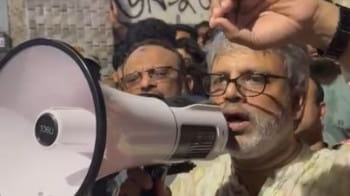Surge in dengue: DMCH overrun with patients from outside Dhaka

Three days ago, 37-year-old Mohammad Hanif was admitted to the Bhedarganj Upazila Health Complex in Shariatpur. As his condition worsened, doctors referred him to Dhaka Medical College Hospital (DMCH) on Thursday.
"I have been undergoing treatment in the dengue ward at DMCH since Thursday night after being referred from the Upazila Health Complex," said Hanif.
He said his platelet count dropped to 20,000, prompting the referral. "The number of dengue cases in our upazila is quite high," he added.
Mohammad Alamgir, 61, a resident of Bhola's Monpura, said he was infected at his workplace in Baufal about five days ago and initially took treatment at home.
"As my condition deteriorated, the doctor advised me to get admitted to DMCH. I've been under treatment here for the past three days," said Alamgir.
Critically ill patients are often referred from local hospitals to major city hospitals. By the time they arrive, their condition is often already severe.
Like Hanif and Alamgir, many dengue patients are arriving at DMCH from outside Dhaka, adding to the hospital's growing burden.
During a visit to DMCH yesterday afternoon, many patients in the dedicated dengue ward on the fourth floor were found to be from outside the capital.
According to the Directorate General of Health Services (DGHS), 95 dengue patients have died and 23,410 have been hospitalised across the country this year.
Among the deaths, DMCH recorded the highest number at 23. It also ranks second in total dengue admissions, with 892 patients till yesterday.
The highest number of dengue patients has been admitted to Mugda Medical College Hospital, with 987, while Mitford ranked third with 440.
Mohammad Sohag, 35, a flower trader from Narayanganj, said he came to DMCH after suffering from high fever, nausea, and diarrhoea.
"I came here to get better treatment at a lower cost," he said.
Nasir Uddin, 49, from Munshiganj's Gozaria, was also admitted to DMCH with similar symptoms.
Dr Nazmus Sakib, a trainee doctor pursuing FCPS at DMCH, said most admitted dengue patients are from outside Dhaka.
"We admit only those whose condition is critical or too risky to treat at home. Others are advised home-based care," he said.
Dr Sakib advised patients to consult a doctor after the onset of fever and drink plenty of fluids like sherbet, green coconut water, oral saline, and fruit juices if diagnosed with dengue. He also stressed preventive measures to avoid mosquito bites, particularly from Aedes mosquitoes.
Dr HM Nazmul Ahsan, associate professor at Shaheed Suhrawardy Medical College Hospital, said critically ill patients are often referred from local hospitals to major city hospitals.
"When these patients arrive, their condition is often already critical," he said. "They get infected outside the capital but die in Dhaka hospitals, which may explain the high death toll reported in the city."
He said time delays are a major problem. "Travelling from Barishal or other distant districts can take five to six hours, plus more time for hospital admission. If a patient is already in shock, such delays can be fatal," he explained.
Dr Ahsan urged local hospitals to follow national dengue treatment guidelines and provide care at the district level.
"Only patients in severe condition should be transferred to Dhaka. Often, patients are referred prematurely out of fear, even when their condition isn't critical," he said.
He further stressed that patients in shock should only be transferred after initial stabilisation. "Unfortunately, many hospitals fail to do this, resulting in patients arriving in decompensated shock, where the risk of death is significantly higher."

 For all latest news, follow The Daily Star's Google News channel.
For all latest news, follow The Daily Star's Google News channel. 



Comments